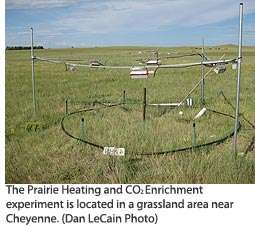Researchers find microbes accelerate soil carbon loss

(Phys.org)—New research from scientists at the University of Wyoming and Colorado State University suggests that the loss of carbon from soils in response to climate change could be accelerated by unexpected responses of soil-inhabiting microorganisms.
The study was published in Ecology Letters, a leading ecology journal, and the research could play an important role in climate change prediction models.
"These findings indicate that climate change could lead to higher rates of soil carbon decomposition, which releases carbon dioxide into the atmosphere," says project leader Elise Pendall, an associate professor of ecosystem ecology in the UW Department of Botany.
"This would exacerbate climate change by increasing global warming, because carbon dioxide is a greenhouse gas," Pendall says. "We also found that plant productivity is higher in the simulated future climate, but the microbial responses seem to offset this effect."
To explore the mechanisms behind the accelerated soil carbon loss under climate change, the UW and CSU scientists studied the important role played by soil microbial communities in a manipulative climate change experiment. The Prairie Heating and CO2 Enrichment (PHACE) experiment was conducted in a grassland area near Cheyenne.
"In the PHACE experiment, we used a novel laboratory method that involved inoculating sterile soils with microbes that have been living under simulated future climates," says Ming Nie, lead research author and a postdoctoral research scientist in the UW Department of Botany. "We asked the question: Have these microbes changed in their ability to decompose soil carbon?"
Researchers found that microbes responded to elevated CO2 and warming by increasing their ability to degrade soil carbon at warmer temperatures, which can accelerate soil decomposition and potentially lead to soil carbon losses. The research suggests that this could eventually diminish sustainability of future plant growth and ecosystem productivity.
Senior co-author Matthew Wallenstein, an assistant professor in the Department of Ecosystem Science and Sustainability at CSU's Warner College of Natural Resources, says, "This study shows that soil microbes can respond to climate change in ways that affect ecosystem functions and can have important consequences for our fragile planet."
Wallenstein says this discovery is not predicted by current ecosystem models and shows why it is vital to understand microbial feedbacks to climate change.
"Accelerated microbial decomposition under climate change would have a negative effect on long-term soil carbon storage, resulting in increased risk of more severe climate change," Pendall says.
More information: onlinelibrary.wiley.com/doi/10 … 1/ele.12034/abstract
Journal information: Ecology Letters
Provided by University of Wyoming
















